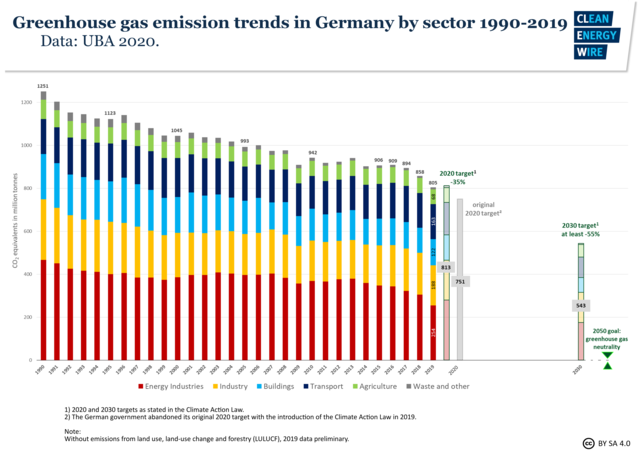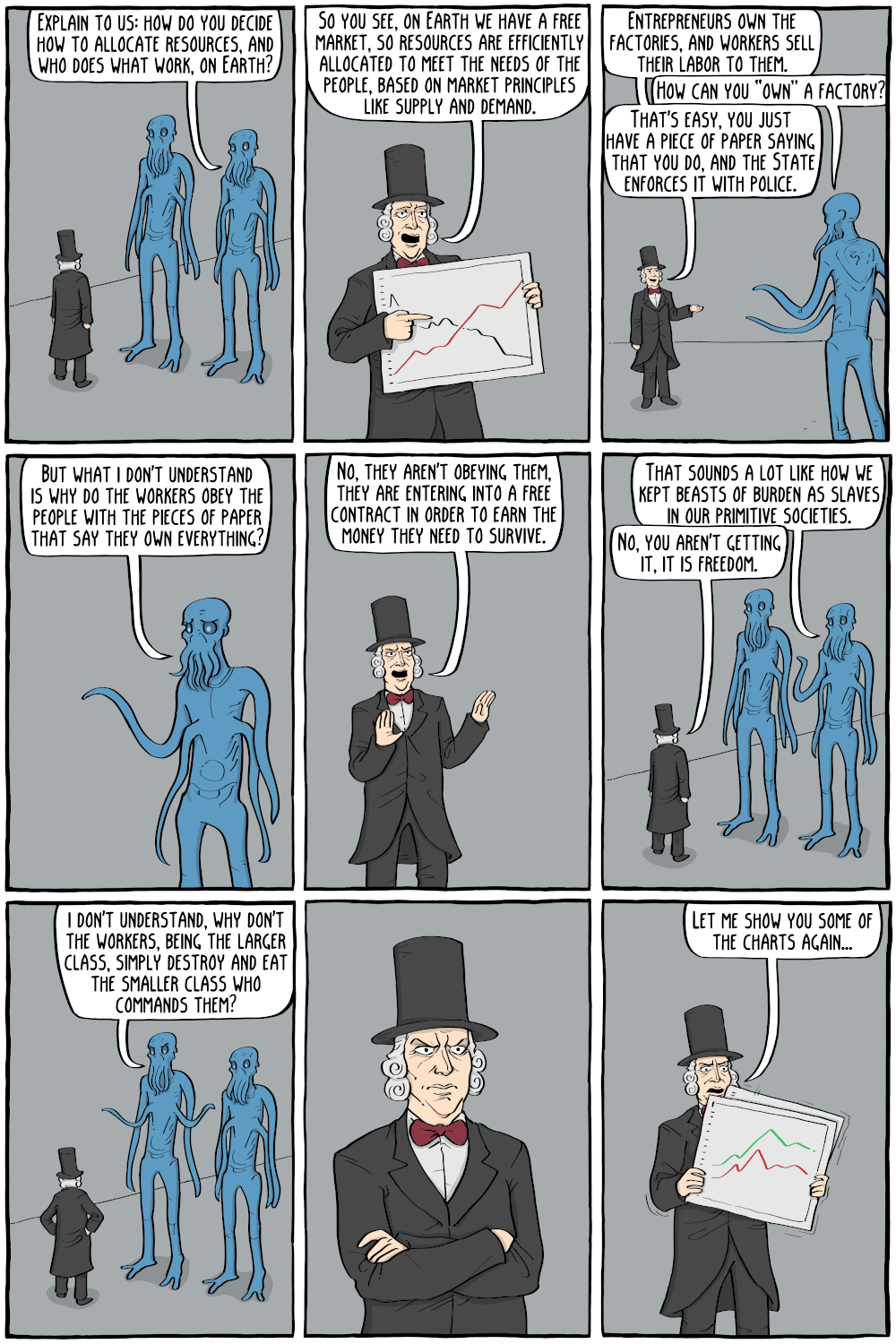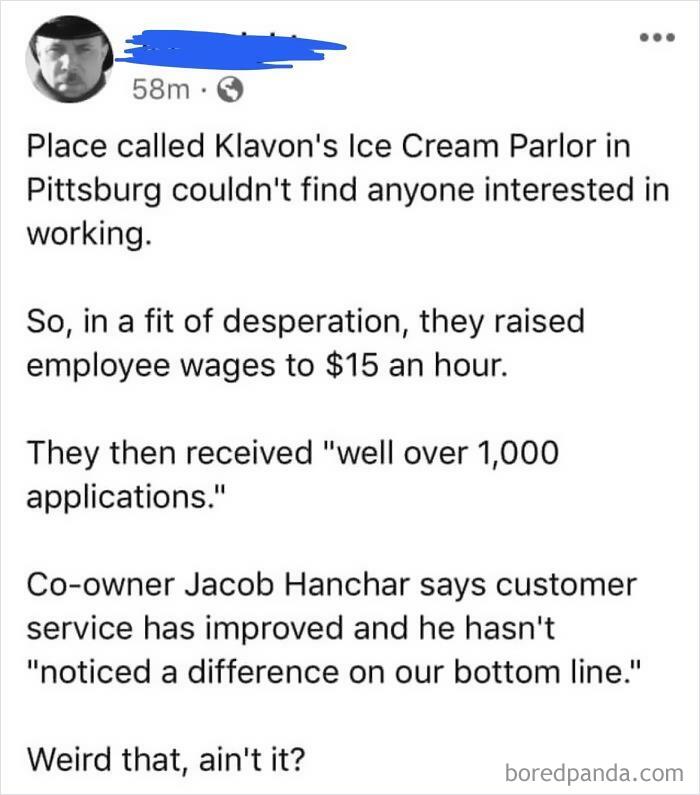Што ме пре 10 година дочекало овде, исто смо разјурили сопствену производњу, америкен стајл.
Kapitalizam 101

- Posts : 41623
Join date : 2012-02-12
Location : wife privilege
- Post n°551
 Re: Kapitalizam 101
Re: Kapitalizam 101
Мени је још пре 20 година било чудно што већ 30 година причају о крају нафте, а овамо ем се свашта довози из далека (нема сезонског поврћа и воћа, скоро свега има увек, у марту има грожђа, из Чилеа), ем се све више и више производње измешта на друге континенте. Још смо тад рекли „ако Кинези престану да их производе, ови ће остати без гаћа“. Јер не само што више нема тих фабрика, него не можеш више да скупиш ту производњу, разишло се знање.
Што ме пре 10 година дочекало овде, исто смо разјурили сопствену производњу, америкен стајл.
Што ме пре 10 година дочекало овде, исто смо разјурили сопствену производњу, америкен стајл.
_____
cousin for roasting the rakija
И кажем себи у сну, еј бре коњу па ти ни немаш озвучење, имаш оне две кутијице око монитора, видећеш кад се пробудиш...

- Posts : 11623
Join date : 2018-03-03
Age : 36
Location : Hotline Rakovica
- Post n°553
 Re: Kapitalizam 101
Re: Kapitalizam 101
ontheotherhand wrote:
Eno PPPovski Miša Brkić odgovara na to sa ali, ali, Venecuela.
Da, video sam. Pri čemu čovek ne razume da su puni rafovi prehrambenih proizvoda u Italiji rezultat svesne državne politike da zemlja bude autarkična po pitanju hrane, a što se pritom postiže subvencijama i protekcionizmom. Sa druge strane, ne sme da postoji uspešna socijalistička država u dvorištu SAD.

- Posts : 41623
Join date : 2012-02-12
Location : wife privilege
- Post n°556
 Re: Kapitalizam 101
Re: Kapitalizam 101

_____
cousin for roasting the rakija
И кажем себи у сну, еј бре коњу па ти ни немаш озвучење, имаш оне две кутијице око монитора, видећеш кад се пробудиш...

- Posts : 3620
Join date : 2018-07-03
- Post n°557
 Re: Kapitalizam 101
Re: Kapitalizam 101
_____
"Sisaj kurac, Boomere. Spletkario si i nameštao ban pa se sad izvlačiš. Radiša je format a ti si mali iskompleksirani miš. Katastrofa za Burundi čoveče.
A i deluje da te napustio drugar u odsudnom trenutku pa te spašavaju ova tovarka što vrv ni ne dismr na ribu, to joj se gadi, i ovaj južnjak koji o niškim kafanama čita na forumu. Prejaka šarža." - Monsier K.

- Posts : 3620
Join date : 2018-07-03
- Post n°559
 Re: Kapitalizam 101
Re: Kapitalizam 101
PARIS, Oct 25 (Reuters) - Sophie Fornairon's independent bookshop has survived the rise of Amazon thanks to a French law that prohibits price discounting on new books, but she says the e-commerce giant's ability to undercut on shipping still skews the market against stores like hers.
Fornairon, who owns the Canal Bookstore in central Paris, now hopes that new legislation that would set a minimum price for book deliveries will even the contest further in the battle of neighbourhood stores against Amazon (AMZN.O).
"It's a just return towards a level playing field," Fornairon, who employs four workers, said. "We're not at risk of closing down any time soon, but Amazon is a constant battle".
Amazon said the legislation, adopted by parliament but not yet enacted, would punish those in rural areas who cannot easily visit a bookstore and rely on delivery.
"Imposing a minimum shipping cost for books would weigh on the purchasing power of consumers," Amazon told Reuters in a statement.
That is an undesirable consequence government officials are wary of at a time President Emmanuel Macron administration is scrambling to head off growing discontent over rising energy prices six months from an election.
In the country of Victor Hugo and Simone de Beauvoir, where local bookshops are held with special affection -- they were deemed 'essential businesses' during latter COVID lockdowns -- the move is the latest by the state to shield national culture against big tech firms.
More than 20% of the 435 million books sold in France in 2019 were bought online and the market share of France's 3,300 independent bookstores has been slowly declining because of competition from online retailers like Amazon, Fnac (FNAC.PA) and Leclerc.
Support from Macron helped push the legislation, which does not target Amazon by name, over the line. The minimum fee still has to be negotiated with the regulator.
'DISTORTED COMPETITION'
French law prohibits free book deliveries but Amazon has circumvented this by charging a single centime (cent). Local book stores typically charge about 5-7 euros ($5.82-8.15) for shipping a book.
Amazon's pricing strategy had resulted in the growing market share of a single operator, the Ministry of Culture said.
"This law is necessary to regulate the distorted competition within online book sales and prevent the inevitable monopoly that will emerge if the status quo persists," the ministry told Reuters.
Centre-right Senator Laure Darcos, who drafted the law, decided upon the minimum delivery charge when she observed how bookstores maintained 70% of their business despite being forced to shut during early COVID lockdowns, because the government reimbursed the shipping fees.
"It showed what a brake on business the postage costs are for local bookstores," Darcos said.
Amazon had lobbied hard against the legislation, worried the French move might set a precedent, the senator said.
France's bookstores are concentrated in towns and cities. Amazon said online sales of books had enabled consumers to have equal access, regardless of where they lived.
Virtually-free delivery allowed book lovers in rural areas to buy books at the same price as someone who could walk into a bookstore -- precisely the spirit of the 1981 law, it said.
Asked when the legislation would be enacted, the Ministry of Culture declined to give a date, saying it was too early to say.
For Fornairon, the bookshop owner, the steady stream of U.S. tourists through her door were a constant reminder of the shield French legislation had already wrapped around stores likes hers.
"They say to me 'we didn't even know independent bookstores still existed'," she said.
($1 = 0.8593 euros)
French law prohibits free book deliveries, but Amazon has circumvented this by charging a single cent. A new legislation aims to even the contest in the battle of independent bookshops against Amazon https://t.co/2LfZvxq5tG pic.twitter.com/7MXyMKfO3z
— Reuters (@Reuters) October 26, 2021

- Posts : 82754
Join date : 2012-06-10
- Post n°560
 Re: Kapitalizam 101
Re: Kapitalizam 101
The wild ride to come
Why the so-called “energy crisis” is both a threat and an opportunity.
By Adam Tooze
- Spoiler:
When it comes to the politics of energy and the climate it can seem as though we are living inside a kaleidoscope. In April 2020 Covid-19 sent oil futures tumbling into negative territory. In May this year, global oil companies were on the run, as ExxonMobil’s diehard management were humiliated by activist shareholders when they demanded that the company take action on climate change. Now, only a few months later, the oil price is more than $80 per barrel for the first time since 2014. With gas and coal also in short supply, the talk is of a “global energy crisis”.
In the UK the sense of panic is particularly acute. Brexit amplifies the uncertainty. But tensions are rising worldwide. In Beijing and Delhi, Brussels and Washington, DC, surging prices for coal, oil, gas and carbon permits are causing alarm in governments and chancelleries. A ripple effect is running through the global economy. As the prices for oil, gas and coal increase, so do the prices of everything that is made out of them, such as fertiliser. That, ultimately, adds to the price of food. Before long, an energy crisis may become something more comprehensive and more politically dangerous – a cost of living crisis.
Fear of stagflation – a combination of low growth and high inflation – haunts the terminals. On this telling, the world is facing a historic rerun of a 1970s-style “energy shock”. Except this time the crisis is not blamed on the Organisation of the Petroleum Exporting Countries (Opec) but on a premature and ill planned push for decarbonisation.
Thanks to crowd-pleasing green policies, so the narrative goes, we are being starved of gas. To some conservatively inclined commentators, the pursuit of net zero appears as a new totalitarian ideology, a “religious-like” cult of state-planning that will impel societies towards global hunger and mass death. According to the head of one influential energy advisory firm, “as with so many previous, state-led utopian revolutions in the 20th century, the road to a promised utopia [in this case ‘net zero carbon’] is littered with the likely reality of a dystopian nightmare”. Apparently, the spectre of Stalin’s famine in 1930s Ukraine is lurking on the horizon.
That particular house of horror may be too gothic even for the fossil fuel lobby. All they need people to believe is that too much talk about the climate crisis has dampened the animal spirits of energy investors. If the owners of gas pipelines and steel mills no longer believe that they have a future, we should not be surprised, analysts warn, that they are in no hurry to boost supply to meet demand. Beneath the logistical snarl-ups of the supply-chain crisis, at the root of our current disorders, the fossil fuel lobby would like people to believe, is an investment strike.
This is a familiar gambit. In economic policy, crisis talk is never innocent. Already in 1943, the Polish economist Michal Kalecki warned his Keynesian friends that in their battle to shape economic policy, the business lobby would use tactics similar to this. Too much government spending, employers would argue, was bad for “confidence” and would depress private investment and undermine growth and jobs. Invoking a “crisis in confidence” is an all-purpose rhetorical weapon. If business representatives declare that their spirits are flagging, who are we to argue with them? As the economist and New York Times pundit Paul Krugman once remarked, in economics the “confidence fairies” are conservatism’s last resort.
Eighty years on, the discourse of today’s “energy crisis” follows the Kalecki playbook to the letter. First, the lobbyists and journalists, eager for a good story, declare energy price rises to be a crisis. Then they attribute the crisis to a shortfall in investment and blame this on a loss of confidence in the future of fossil fuels. The conclusion writes itself. To push down energy prices, all we have to do is moderate overly aggressive climate policy and give gas more latitude as a key transition fuel. Even the undead nuclear industry can be summoned from the crypt.
Content from our partners
Renting jeans and insect proteins could help cure us of our addiction to disposable goods
But if we are serious about eliminating fossil fuels from energy systems, we are going to have to get used to weathering this type of crisis talk. Governments and societies at large have to call the bluff of the confidence lobby.
What does a serious climate policy actually entail? The pursuit of net zero is a deliberate effort to make history by restructuring national economies. This involves planning, which will scare conservative liberals who prefer to let nature, as they understand it, take its course. In the process, entrenched fossil fuel interests – before they are driven to extinction – will become discouraged and will cease investing. But, as the International Energy Agency said in a recent path-breaking net zero report, if the world wants to stabilise the climate then that is what is needed. No new investment in the development of oil and gas fields. With immediate effect.
Forcing the energy transition to renewables comes with the likelihood of error. We are no longer in the 1990s, a time of neoliberal orthodoxy. We have woken up from the dreams of the once-promised end of history. The responsibility is daunting. But we make the task harder by summoning the worst nightmares of 20th-century history – whether those are the 1930s or the 1970s. We have our own problems to worry about and they are radically new. The global carbon budget is nearing exhaustion. To have a two in three chance of stabilising the climate at 1.5 degrees we can emit no more than 420 gigatonnes of CO2. On the current trajectory we are likely to exhaust that budget by 2030. The horror scenario is not a second-coming of 1930s-style “central planning”, but the catastrophic trajectory we are already on.
Regrettably, the difficulties that we face with respect to energy price rises have little to do with our net zero ambitions. These are not the birth pangs of a new sustainable future. Instead, they reflect the tensions within today’s unbalanced and unsustainable fossil-energy system. It would be the bitterest irony if our energy difficulties were exploited to maintain the dangerous and dysfunctional status quo.
There is one common cause underlying rising energy prices today – the recovery of demand following the Covid-19 pandemic. The price dynamics, however, of the three big markets – oil, coal and gas – are the result of specific factors, which have developed unevenly around the globe.
In the US, the first symptom of stress is the price of petrol at the pump, which according to the Bureau of Labor Statistics has surged by 40 per cent since 2020. This drives up the cost of living and triggers fears of inflation. It also stirs more generalised talk about an energy crisis. The cost of petrol is the least surprising of the price movements. Oil prices last year were low. It would take a peculiarly twisted imagination to attribute the strategy of limiting production, which the Opec did in 2020 at the urging of the Trump administration, to an excess of green ambition. In curtailing oil production, Saudi Arabia and Russia are trying to balance the market as they have done since 2016. If the US’s fracking industry is not increasing production, it is because investors are demanding that producers finally pay out some profit.
The surge in coal prices is driven by China and India, which together account for 65 per cent of global consumption. The revival of industrial production after Covid sent demand soaring, driving up prices. In India, stocks of coal at the power plants are now dangerously low. The effect has been compounded by flooding in one of the major Chinese mining regions. As fixed electricity tariffs and surging fuel costs made supply unprofitable, generators have gone offline.
On Beijing’s orders, provincial authorities in regions throughout China have imposed caps on electricity generation to meet Xi Jinping’s objective of reaching peak emissions by 2030. Curbing power production will close factories, which may create bottlenecks and price increases in the West. All this will encourage the crisis discourse. But, what kind of crisis is this? Beijing’s policies will increase electricity prices in China, but as far as global energy markets are concerned, the result is not to drive prices up, but to relieve pressure on supply. The same is true of China’s politically motivated boycott of Australian coal. What Beijing doesn’t buy becomes available for other consumers.
The unusual pressures in Asia rippled to Europe by way of the gas market. A severe cold snap in early 2021 made China the largest buyer of Liquefied Natural Gas (LNG), which pushed up prices. Europe’s stocks were depleted to the lowest levels in ten years and the pipeline network took time to respond. The Dutch government announced that the Groningen gas field in the Netherlands will be closed by 2022, due to earthquakes triggered by overenthusiastic drilling. Russia is building up stocks for the winter and Gazprom is stalling over meeting Western European demand. Sensing an easy killing, speculators have driven prices upwards to eye-watering levels. In early October the spot price for November delivery of LNG in North Asia reached a staggering $56 per million British thermal unit, which is the equivalent in oil of over $320 a barrel.
In Britain, meanwhile, panic was stirred not only by lines at petrol stations, but by the failure of the ramshackle, privatised gas market. Since September more than ten small energy firms – caught between fixed price contracts with consumers and surging global gas prices – have collapsed, leaving larger firms to pick up the loss-making contracts.
There is clearly an extraordinary array of factors behind rising energy prices. But as Fatih Birol, the IEA’s executive director, remarked, little of this has anything to do with the push for net zero. “Some people are trying to portray this as the first crisis of the energy transition,” he told the Financial Times. But blaming green policies is “inaccurate and misleading”. Not only that, Birol continued, “if this is the dominant voice coming from this situation it may become a barrier to the policies we need to enact to make the energy transition work.” Rather than green policies, it is the climate crisis itself that is exacerbating the pressure on supply. “Global stilling” – a calming of wind flows in Europe – may have contributed to idling wind farms, while severe droughts and harvest failures in the US and Brazil are driving up global food prices.
To retreat from net zero on account of the “energy crisis” of 2021 would be a disastrous mistake. Encouraging new fossil fuel investment to “support the transition”, and pressuring suppliers to increase energy production, feeds the fossil fuel habit. It entrenches the idea that it should be the job of government to ensure abundant and cheap fossil fuel supplies. The Biden administration, which has asked Opec to increase production for the sake of the American “middle class”, is a demonstration of what not to do. Biden’s political advisers no doubt insist that it is essential to bring down petrol prices ahead of the 2022 midterm elections. But that is a sign of the desperate political straits the Democrats find themselves in. It is one more reason to dismiss any American claim to climate leadership ahead of Cop26.
As true disciples of neoliberalism, the EU and the UK have working systems of carbon pricing in place. In Europe tax already accounts for between 25 and 60 per cent of most energy prices. It may make sense to use tax cuts to moderate the sharp spikes in prices. But the aim should be to keep energy prices for all types of consumers headed steadily and predictably upward. Since the 2005 launch of the EU’s Emissions Trading System and its UK annex, polluters have been required to buy the right to emit CO2. For many years this was a sick joke. Permits have been handed out for free to gas-belching industrial consumers. That certificates are now trading at around €60 per ton (up from around €30 per ton) should be a cause for quiet celebration.
It is a sign that business believes Europe’s governments are serious about net zero, which pressures future polluters to clean up their act. The initial priority was to drive out coal from the energy-supply system. But gas has to be run down too. To retreat from the logic of pricing carbon, on account of our current energy price spike, would risk permanently undermining the credibility of one of the most powerful tools of decarbonisation that the EU and UK have.
Where this creates problems of energy poverty, the key for governments must be to react proactively and generously. There has been much ominous talk of the return of the gilets jaunes, the French protesters who caused havoc in Paris and elsewhere in France in 2018. But scaremongering about popular protests is the political equivalent of invoking the “confidence fairies” to attack economic policies disliked by business interests. To separate the gilets jaunes myth from reality, it is crucial to ask what caused the movement. The immediate trigger may have been an increase in the price of diesel. But the broad base of indignation was due to a raft of unequal social and economic policies adopted by Emmanuel Macron’s government.
The lesson is not that an increase in energy prices is intolerable but that it has to be embedded in a broader and equitable social settlement. Rather than declaring the energy transition too difficult for voters to comprehend and impossible for them to get behind, responsible democratic leadership would consist in debunking crisis talk, explaining why price increases are happening and starting a serious debate about how the transition can be made fairly and without unduly burdening those most at risk.
The same argument goes for anxieties over surging global food prices. A spike in food prices triggered by rising fertiliser and other costs could be a catastrophe for the world’s poorest countries. The solution, however, is not to undertake a quixotic effort to reduce food prices by pumping more gas into fertiliser plants. The solution in the short term is to properly fund aid budgets. In the medium term the priority must be to finance sustainable development. In the modern world, famine is not the result of absolute production shortages, but of poverty and maldistribution. Wealthier countries should take measures to address the scandalous waste which accounts for one third of all food produced globally. To scaremonger against net zero on the grounds that the poor of the Earth will starve is cynical.
For the energy Cassandras, the ultimate fear is that shortages are so severe that they interrupt production. Without gas or power, things will simply grind to a halt. In poor countries in the Global South – where hundreds of millions live on the boundary of extreme poverty – this is a real concern. Rich countries have more options. Heat, light and power to households and essential services must be sustained. Apart from that, we may have to ration energy supplies for industrial consumers. China is resorting to significant load-shedding, which may cause interruptions in production and employment. But as far as the workforce is concerned, the Covid crisis taught the world a crucial lesson. Furlough systems work and governments can use short-term measures to support the payroll, even for months at a time.
Far from reducing green ambition, the current unsustainable situation should energise investment in wind, solar and other renewable options. Societies must undertake intensive research and development of storage capacity and reduce overall energy consumption. What is not negotiable is the target of net zero by 2050.
We have barely begun to embark on a process of major structural change. Given the fragility of our energy system, we may in future have to cope with periods in which prices gyrate and unpredictable bottlenecks appear. In such moments the challenge is not only to address the immediate problems, but to accelerate decarbonisation. We can no longer afford the cognitive dissonance of combining radical targets for 2030 or 2050 with a short-term defence of the status quo. This has to be borne in mind, particularly in regard to Cop26, which has long been billed as momentous. The conference will seek, once again, to solidify a decarbonisation timeline. Those debates will garner worldwide attention, but, all too often, they have a hypothetical quality. The promised future of decarbonisation never seems to arrive.
The surge in energy prices, by contrast, is immediate and real. If the world reacts by seeking to protect the status quo we defer the future and narrow our options. If, instead, 2021 continues without a significant increase in oil, gas and coal production and without making any new fossil fuel investments – and if cushioning the crisis were to cost a small fraction of GDP, and CO2 emissions continued to decline – then that would be something to celebrate. And then we need to do it again and again and again. In 2022 and 2023 and so on.
The energy transition is a historic experiment. We are all going to have our moments of panic and disbelief. We are all going to have to battle with our ghosts, with nostalgia and with deep-seated fears from the past. It will be a steep learning curve. It may be a turbulent journey. But the one thing that we can be certain of – and 2021 confirms it – is that the status quo offers no safety.
This article appears in the 27 Oct 2021 issue of the New Statesman, Our Fragile Future
Adam Tooze
_____
"Oni kroz mene gledaju u vas! Oni kroz njega gledaju u vas! Oni kroz vas gledaju u mene... i u sve nas."
Dragoslav Bokan, Novi putevi oftalmologije

- Posts : 11623
Join date : 2018-03-03
Age : 36
Location : Hotline Rakovica
- Post n°561
 Re: Kapitalizam 101
Re: Kapitalizam 101
Svaka cast Adamu, ali ovo sto prica je jasno od pocetka. Problem je sto bogati ne zele da se isprse da amortizuju prelazak na obnovljive izvore energije, a stanovnistvo razvijenog sveta ne zeli da se odrekne potrosnje. Da bi se i jedni i drugi naterali potrebna je vlast sa celicnim legitimitetom, a takve nema usred nejednakosti, korupcije i kulturnih ratova. Oni ne mogu da vakcinisu svoje stanovnistvo, a treba da ga nateraju na potpunu promenu nacina zivota, i to barem u pocetku na gore.
_____
Sve čega ima na filmu, rekao sam, ima i na Zlatiboru.
~~~~~
Ne dajte da vas prevare! Sačuvajte svoje pojene!

- Posts : 52531
Join date : 2017-11-16
- Post n°562
 Re: Kapitalizam 101
Re: Kapitalizam 101
Clanak je super i sve je u pravu. Ima samo 1 potencijalni ptoblem. Postoje zemlje u kojima su izbori slobodni, kao i stampa. Hocu da kezem, ovo nece raditi na nivou politike, nego samo na nivou oostedrustvenog konsenzusa, koji ce se onda reflektovati u politici apsolutno svake znacajnije stranke.

- Posts : 11623
Join date : 2018-03-03
Age : 36
Location : Hotline Rakovica
- Post n°563
 Re: Kapitalizam 101
Re: Kapitalizam 101
Pa i da su autoritarni rezimi, isto je. Ne znam da li je ikad u istoriji pravljen takav konsenzus, gde se obavezujemo da cemo ziveti losije. Uvek je bilo da zivimo bolje.
_____
Sve čega ima na filmu, rekao sam, ima i na Zlatiboru.
~~~~~
Ne dajte da vas prevare! Sačuvajte svoje pojene!

- Posts : 11623
Join date : 2018-03-03
Age : 36
Location : Hotline Rakovica
- Post n°564
 Re: Kapitalizam 101
Re: Kapitalizam 101
Sto se mene tice, ja sam sasvim ok sa degrowthom. Ja to zamisljam kao da cemo ziveti u onim pittura metafisica pejzazima, obuceni u futuristicke tunike. I blejali bi po ceo dan, debatovali, citali knjige, i priredjivali predstave a la zlatko pakovic.
_____
Sve čega ima na filmu, rekao sam, ima i na Zlatiboru.
~~~~~
Ne dajte da vas prevare! Sačuvajte svoje pojene!

- Posts : 5594
Join date : 2016-01-26
- Post n°565
 Re: Kapitalizam 101
Re: Kapitalizam 101
Швабе су се опасуљиле после ових великих поплава које су побиле људе и направиле дармар. Политичари увек могу да узму такве катастрофе, укажу на проблем глобалног загревања и климатских промена и понуде рачуницу - или ћете да развијете шкрге или ћемо морати да живимо лошије неко време. Та рачуница је и даље у корист фосилних горива, али све мање. Чак и у Кини им је јасно да се мора тражити неко ново решење, да овако даље не може.
Нуклеарке ће можда остати у функцији, а угаљ ће бити полако избациван.
Притисак на Пољску од стране Чешке и Немачке да се угаси скоро ганц нова електрана и угљенокоп је све већи.
Нуклеарке ће можда остати у функцији, а угаљ ће бити полако избациван.
Притисак на Пољску од стране Чешке и Немачке да се угаси скоро ганц нова електрана и угљенокоп је све већи.
_____
Burundi is an exception among other nations because it is a country which gave God first place, a God who guards and protects from all misfortune.
Burundi... opskurno udruženje 20ak levičarskih intelektualaca, kojima je fetiš odbrana poniženih i uvredjenih.

- Guest
- Post n°566
 Re: Kapitalizam 101
Re: Kapitalizam 101
Nuklearke moraju da ostanu u funkciiji i što pre ljudi to shvate, to bolje.
Ono što se sada dešava u EU zbog energije je potpuni kolaps. Imao sam dve neplanirane konferencije u poslednja dva radna dana i sve ono što sam čuo je katastrofa. Gomila firmi će moža biti zatvorena tokom zime, da bi bilo dovoljno energije za grejanje.
Ono što se sada dešava u EU zbog energije je potpuni kolaps. Imao sam dve neplanirane konferencije u poslednja dva radna dana i sve ono što sam čuo je katastrofa. Gomila firmi će moža biti zatvorena tokom zime, da bi bilo dovoljno energije za grejanje.

- Posts : 55
Join date : 2021-06-20
- Post n°567
 Re: Kapitalizam 101
Re: Kapitalizam 101
Летећи Полип wrote:Svaka cast Adamu, ali ovo sto prica je jasno od pocetka. Problem je sto bogati ne zele da se isprse da amortizuju prelazak na obnovljive izvore energije, a stanovnistvo razvijenog sveta ne zeli da se odrekne potrosnje. Da bi se i jedni i drugi naterali potrebna je vlast sa celicnim legitimitetom, a takve nema usred nejednakosti, korupcije i kulturnih ratova. Oni ne mogu da vakcinisu svoje stanovnistvo, a treba da ga nateraju na potpunu promenu nacina zivota, i to barem u pocetku na gore.
Ko ne moze da vakcinise stanovnistvo? Nemacka na 70% vakcinisanih, svabi kada drzava kaze da to uradi on to radi. Cak su hteli da ukinu sve mere, tipa maske, jos ove jeseni ali su odlozili za mart iz predostroznosti. Danci su ukinuli koliko sam video. To ima pozitivne strane ali i negativne ako dodje brkati moler iz Beca na vlast. Ali da ne ulazim u kulturoloske razlike slovena i germana, nije to tema.
Da vam kazem kako se u Nemackoj cela infrastruktura pravi ka elektricnoj mobilnosti i cak iskljucivanjem coveka iz voznje. Masovno se koriste bicikli, vozovi se tako prave da ima mesta za bicikle. Zabrana ulaska u centrlane delove grada za kola je skoro sigurna u buducnosti. To vam je trenutno u Nemackoj. A to dolazi i u Srbiju. Takodje nije tacno da svabe ne zele da se odreknu odredjenih privilegija ili su spremni na vece cene zarad prelaska na nove izvore energije. Ali Nemacka je drugaciji slucaj od SAD. U SAD je utkana nafta, njihov nagli razvoj je vezan za naftu nakon Gradjanskog rata i formiranjem prve zaista mocne americke kompanije a to je Standardoil. Nemacka od 1914 pokusava na sve nacine da se skine sa naftno-gasne sise jer nemaju toga. Pa je brkati moler govorio da jurca na SSSR zbog nafte u kapsijskom regionu. Dakle Nemci zele sto pre da dodje novo doba u kojem oni vide svoju dominaciju, kao i uvek. A ni Kinezi ili Japanci nisu daleko od tih ideja kada govore o energetskoj tranziciji ili kako su to Nemci jos pre 10 godina nazvali energiewende.
Ugalj nece izaci iz price, Kina i Indija ne mogu bez uglja. Modernizovace se TE na ugalj i to se vec desava. Vec sada nove TE, koje se prave i u Nemackoj, ne zagadjuju sa prassinom i toksicnim gasovima ali ostaje problem CO2, koji moze da se resi ali je tehnologija jos skupa. Nuklearke sigurno ostaju. Francuzi su vec rekli svoje unutar EU.
Last edited by solzenjicin on Sun Oct 31, 2021 1:30 am; edited 2 times in total

- Posts : 3803
Join date : 2020-09-27
Location : Waystone Inn
- Post n°568
 Re: Kapitalizam 101
Re: Kapitalizam 101
Ja sve ovo gledam eurocentrično - obvezali smo se na nekakav EU fit for 55 smanjenje emisija CO2, režije odu u nebo, ako imaš sreće država ti pomogne po tom pitanju, a cijelo vrijeme ne znaš koliko se druge zemlje ičega drže, i misliš se koji kurac mi plaćamo ovoliko struju kad to ništa nema smisla ako nije na globalnoj razini.
Speaking of global, drugarice i drugovi, uveli su globalni porez
https://www.washingtonpost.com/us-policy/2021/10/30/biden-g20-global-minimum-tax/
Speaking of global, drugarice i drugovi, uveli su globalni porez
https://www.washingtonpost.com/us-policy/2021/10/30/biden-g20-global-minimum-tax/
_____
my goosebumps have goosebumps

- Posts : 55
Join date : 2021-06-20
- Post n°569
 Re: Kapitalizam 101
Re: Kapitalizam 101
Energiewende

Inace se po Nemackoj svuda postavljaju solarni paneli cak i tamo gde nema sunca previse i to je preterivanje sto rade. Ali tako je to u Nemackoj, kada zapucaju na jednu stranu onda idu kao mazge tuda.
Energiewende in Deutschland: Definition, Ziele und Geschichte
https://www.energiewende.de/start
Aktuell stammt in Deutschland ein Drittel des Stroms aus Wind, Sonne oder Biomasse, der Ausstoß der klimaschädlichen Treibhausgase wurde bis 2016 gegenüber 1990 um rund 27 Prozent gesenkt. 2022 gehen die letzten drei deutschen Atomkraftwerke vom Netz. Und doch ist der Weg noch weit: So wird Deutschland voraussichtlich deutlich das Ziel verfehlen, bis 2020 die Treibhausgasemissionen um 40 Prozent gegenüber 1990 zu reduzieren.

Inace se po Nemackoj svuda postavljaju solarni paneli cak i tamo gde nema sunca previse i to je preterivanje sto rade. Ali tako je to u Nemackoj, kada zapucaju na jednu stranu onda idu kao mazge tuda.
Energiewende in Deutschland: Definition, Ziele und Geschichte
https://www.energiewende.de/start
Aktuell stammt in Deutschland ein Drittel des Stroms aus Wind, Sonne oder Biomasse, der Ausstoß der klimaschädlichen Treibhausgase wurde bis 2016 gegenüber 1990 um rund 27 Prozent gesenkt. 2022 gehen die letzten drei deutschen Atomkraftwerke vom Netz. Und doch ist der Weg noch weit: So wird Deutschland voraussichtlich deutlich das Ziel verfehlen, bis 2020 die Treibhausgasemissionen um 40 Prozent gegenüber 1990 zu reduzieren.

- Posts : 8095
Join date : 2020-09-07
- Post n°570
 Re: Kapitalizam 101
Re: Kapitalizam 101
Woman billed $700 after sitting in ER waiting room for 7 hours, leaving without treatment
https://www.fox5atlanta.com/news/woman-billed-700-after-sitting-in-er-waiting-room-for-7-hours-leaving-without-treatment
https://www.fox5atlanta.com/news/woman-billed-700-after-sitting-in-er-waiting-room-for-7-hours-leaving-without-treatment
_____
Sweet and Tender Hooligan

- Posts : 11623
Join date : 2018-03-03
Age : 36
Location : Hotline Rakovica
- Post n°571
 Re: Kapitalizam 101
Re: Kapitalizam 101

_____
Sve čega ima na filmu, rekao sam, ima i na Zlatiboru.
~~~~~
Ne dajte da vas prevare! Sačuvajte svoje pojene!

- Posts : 7665
Join date : 2020-03-05
- Post n°572
 Re: Kapitalizam 101
Re: Kapitalizam 101
Vanzemaljci u stvari pitaju “a zašto ne probate komunizam?”. Nisu to vanzemaljci, to su Marks i Engels.
_____
"Burundi je svakako sharmantno mesto cinika i knjiskih ljudi koji gledaju stvar sa svog olimpa od kartona."
“Here he was then, cruising the deserts of Mexico in my Ford Torino with my wife and my credit cards and his black-tongued dog. He had a chow dog that went everywhere with him, to the post office and ball games, and now that red beast was making free with his lion feet on my Torino seats.”

- Posts : 41623
Join date : 2012-02-12
Location : wife privilege
- Post n°573
 Re: Kapitalizam 101
Re: Kapitalizam 101
Уопште не видим то, него што к101 у ствари почива на гомили договорених бесмислица, тј. то је једна договорна економија, а договарало се само уже друштванце. И кад почнеш да постављаш незгодна питања, не одговарају на њих, него крећу испочетка са мантрама.
Нешто као кад верник почне да ти објашњава своју догму као логичку конструкцију.
Нешто као кад верник почне да ти објашњава своју догму као логичку конструкцију.
_____
cousin for roasting the rakija
И кажем себи у сну, еј бре коњу па ти ни немаш озвучење, имаш оне две кутијице око монитора, видећеш кад се пробудиш...

- Posts : 3803
Join date : 2020-09-27
Location : Waystone Inn
- Post n°574
 Re: Kapitalizam 101
Re: Kapitalizam 101
Ove sijede loknice i grafovi isti Steven Pinker koji danas uz our world in data grafove objašnjava kako super živimo.
_____
my goosebumps have goosebumps

- Posts : 82754
Join date : 2012-06-10
- Post n°575
 Re: Kapitalizam 101
Re: Kapitalizam 101
Bebo, jesi li ti Marks i Engels, jery bi očigledno htela da ukineš kapitalizam.
_____
"Oni kroz mene gledaju u vas! Oni kroz njega gledaju u vas! Oni kroz vas gledaju u mene... i u sve nas."
Dragoslav Bokan, Novi putevi oftalmologije



 by паће Mon Sep 20, 2021 11:19 am
by паће Mon Sep 20, 2021 11:19 am

